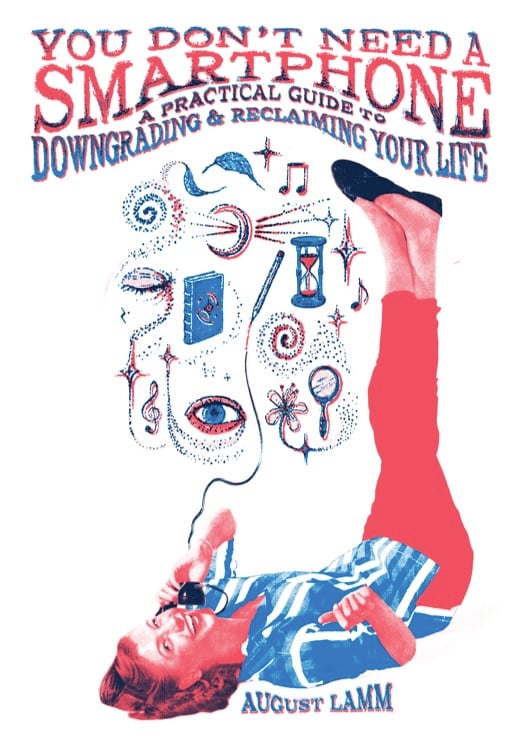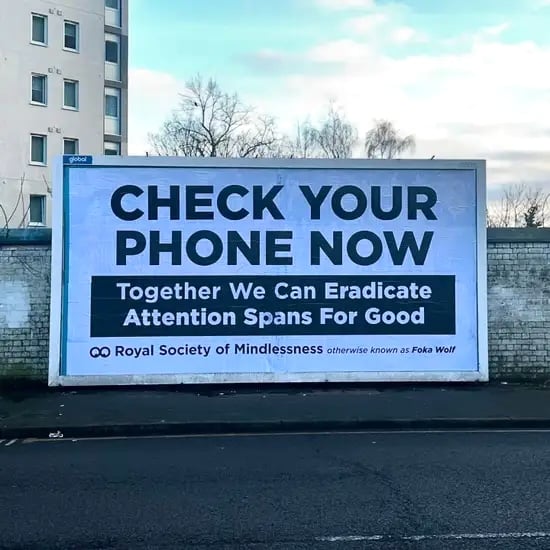A heartfelt plea to ditch the smartphone
Years ago, just when smartphones were gaining popularity, a memorable print ad appeared, boasting about the capabilities of the new devices. As I remember it (since I can’t find an image of it at the moment), the ad showed an area cluttered with a variety of physical objects: a clock, a CD player, a notepad, and a full-sized telephone, among others. The tag line was something like, “All of these now fit into your pocket.” Buy a smartphone, the ad promised, and you’ll have access to a sparkling array of tools and abilities.
The ad was accurate, in a narrow sense, but it left out a much more important truth. Yes, a smartphone tells time, and plays music, and makes calls. But it also brings about surveillance, disinformation, addiction, political polarization, unconsensual porn, mental health harms for users and content moderators, and more. All of that fits into your pocket.
In the years since the ad, most people have adopted the smartphone, and the effects are palpable even if you aren’t using one. Here in Manhattan, it’s rare to walk a block without passing someone slowly shuffling along the sidewalk while gazing at the glowing rectangle in their palm. Or sit down on a subway train and try to find anyone who doesn’t have a screen in their face or Big Tech earbuds jammed in their ear canals. Nearly everyone is plugged into digital tech, all the time, thoughts and behavior slowly being nudged, manipulated, and programmed by corporations 3,000 miles away from New York.
Walking and riding the subway here used to offer nonstop opportunities for “New York moments”: observing and occasionally talking with strangers who, like me, were caught in the swirl of a raucous and diverse city. Nowadays it feels more like being in a zombie movie.
The idea of “phone zombies” isn’t new, of course. As far back as 2019 I discussed the idea with Jeremiah Moss, author of Vanishing New York, on Techtonic – stream the audio or see episode page. (Moss wrote more about phone zombies in his followup book, Feral City.) Since then, the iPhone and Android zombification of New York has only accelerated.
This is why I was so excited to speak with 29-year-old anti-tech activist August Lamm on Techtonic this week. (Stream the show or see episode page.) A writer, visual artist, and former Instagram influencer, Lamm came to the realization after years of heavy phone use that the device wasn’t worth her time and energy. So she ditched it.
August recounts this story in her pamphlet You Don’t Need a Smartphone: A Practical Guide to Downgrading and Reclaiming Your Life.

(You can read an excerpt in The Guardian, or you might like August’s recent NYT piece – here’s a gift link: I Gave Up My Smartphone for a Dumbphone. You Can, Too.)
The relentless pressure for continual upgrades left August with up-to-date technology but feeling “socially isolated.” Her answer, she says, was to downgrade: “the radical decision to step backward in an age of dizzying, almost compulsory forward momentum.”
During our Techtonic interview August spoke passionately about the value of downgrading to a flip phone. Ending one’s relationship with a smartphone opens the possibility of a more meaningful existence. After all, our lives are not meant merely to be a platform for some kind of frictionless productivity. As August told me:
What you’re reclaiming is your life. It’s not your role in the capitalist machine. It’s you and your presence on earth, because that’s really all you have.
August’s testimonial reminded me of what another Techtonic guest told me back in November, when I interviewed members of the Luddite Club. As I also mentioned in my Nov 15, 2024 column, here’s how one of them described life without a smartphone:
I'm just taking a more active role in my life. What that looks like for me is, I have a bunch of different hobbies and I'm trying out new things every week, but mostly just creating. I have so much time to write things, draw things, paint things, sew things, sculpt things, and also take classes.
The thing about smartphone advertisements, August said during our interview, is that they always list what smartphones give you, but never what they take away – things like your time for healthier activities, your attention span, your ability to think, your very lived experience moment-to-moment. (Come to think of it, Apple’s ad campaign last year was totally honest on this point. See my column from last May, Apple made a terrible mistake: it told the truth.)
Of course, ditching the smartphone for a flip phone is not going to be everyone’s answer. Some people need certain apps for work, or to communicate with friends or family. The point here isn’t to follow a script of which devices and apps to use or not, but rather to think for yourself about which tech really serves you, and which should just be thrown in the river.
For my part, I’m hoping to do a better job of spotlighting flip phones, and other alternatives to Big Tech, by reviving Good Reports. This is my resource website listing non-Big Tech tools in various categories: phones, search, email, VPNs, and so on. I suspended the project awhile back as I needed to find a way to fund it. My plan is to post some of the picks on the public site, with details available to Creative Good members on our Forum.
Anyway, you’ll know when Good Reports relaunches, because I’ll make a big deal about it here in the newsletter. But I could use your help. To support the revival of Good Reports, and show your support of this newsletter, please join Creative Good. We’d love to have you on board.

Until next time,
-mark
Mark Hurst, founder, Creative Good
Email: mark@creativegood.com
Podcast/radio show: techtonic.fm
Follow me on Bluesky or Mastodon
🙏
P.S. Your subscription is unpaid. If you want to support my work on the newsletter, please join us at Creative Good. (You’ll also get access to our members-only Forum.)